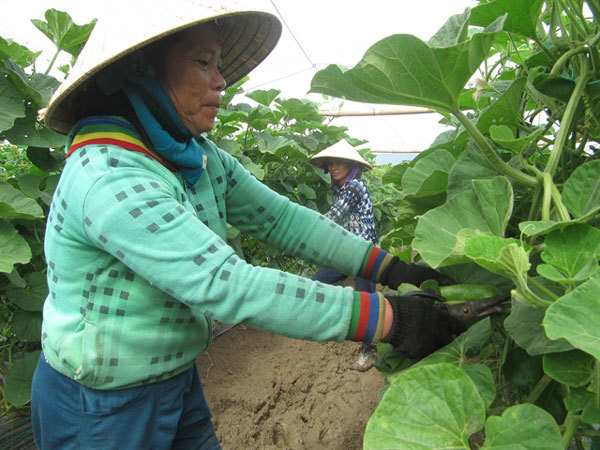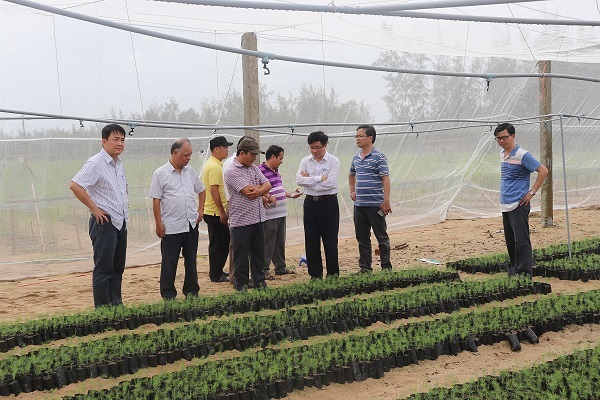 |
| Vo Manh Tu prepares bunches of his asparagus before selling them. —VNA/VNS Photo Ngoc Phuoc |
But asparagus is not an easy plant to grow.
Most of the inexperienced farmers had to stop growing it after seeing the plants wither due to pesticide overuse.
Vo Manh Tu, 24 years old, was the only farmer who didn't abandon asparagus.
He studied and used organic and environmentally-friendly elements to feed one hectare of asparagus with 14,000 roots in his farm.
Tu started by selecting micronutrients from plants and leftovers like chillies, garlic, lemongrass, ginger, pomelo peel, fish bones, beef bones, soybeans, bananas and moringa leaves, then mixed them together and fermented the mixture.
The water-diluted organic mixture fed to the asparagus increased the plant’s resistance to insects and helped it grow quickly.
“On the first days I tried the mixture, other farmers did not trust it. They did not like the unpleasant smell of fermented soybean. The first soybean mixture came out with a yeast-like smell and others changed their attitude towards my method,” Tu told the Vietnam News Agency.
The organic technique helped increase the productivity of Tu’s asparagus.
The chemical-free asparagus grown by the young farmer has become widely known by local people and those from neighbouring areas. Many traders have visited his farm to buy the vegetables.
When picky traders wanted to check whether the vegetables were really organic, Tu stayed quiet and simply picked an asparagus branch and ate it.
To ensure supply, about 30kg of asparagus is harvested each day.
The vegetables are harvested for six months a year. In the other months, Tu leaves the plant to take a rest and wait for new branches to grow from the old ones without having to seed new plants.
Top tier asparagus is sold to restaurants and apartment buildings at the price of VND110,000 (USS$4.7) per kilo, while lower quality versions sell for VND70,000-80,000 ($3-3.5) per kilo for regular consumers.
Tu’s consumption market is mostly in Quang Ngai Province and Da Nang City.
Tran Thi Hoa, a customer in Quang Ngai, said she buys the organic asparagus from Tu’s farm because the vegetables are clean.
The organic model has helped Tu have a stable income of about VND60 million ($2,600) per month and more than VND500 million ($21,740) per year.
Compared to other vegetables, asparagus brings higher economic efficiency and helps create jobs for local farmers with a daily income of VND6.5 million each.
“Myself and many other asparagus growers in the province have connected to expand the growing area and look forward to creating a specialised organic asparagus farm to meet the increasing demand of customers,” Tu said.
Phan Thi Cam Van from the Technology Market and Management Division, Department of Science and Technology of Quang Ngai Province, said growing asparagus is not a new farming model in the province but there are not many organic models like Tu’s.
“This model makes use of natural raw materials and ensures high quality and safety of the products. Tú has built a sales distribution channel and intends to expand production scale,” she said.
Vo Cong Thanh, chairman of the People's Committee of Hanh Phuoc Commune, Nghia Hanh District, said Tu was an example of a young person having success in his own homeland.
The organic asparagus planting paves a new direction for an effective farming model in the locality and needs to be widely spread, he said. VNS

Organic farms fuel sustainable development
Born in Dien Ban Town, Quang Nam Province, 37-year-old Duong Hien Tu has developed the area's first organic ecological agriculture system and a sustainable farming model over the past seven years to create the An Phu organic farm brand.

Nuclear technology applied in production, daily life in Vietnam
Vietnam’s nuclear engineering is used in traditional fields but also in organic agricultural development, farm produce origin tracing, and others.